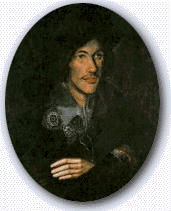 During his later years in life, John Donne's latter poetry took his controversial themes and applied them to religious matters rather than secular affairs; as "The Flea". "Holy Sonnet XIV" is a plea to the Divine to have a more pronounced impact in the life of the speaker.
During his later years in life, John Donne's latter poetry took his controversial themes and applied them to religious matters rather than secular affairs; as "The Flea". "Holy Sonnet XIV" is a plea to the Divine to have a more pronounced impact in the life of the speaker.The first quatrain of the poem acknowledges the power and nature of God. The narrator specifically refers to the Divine as "three-person'd God" to reflect his religious beliefs. He acknowledges that his ultimate fate is within God's hands, that the Divine could "...break, blow, burn, and make me new". The narrator has no delusions of grandeur: God is the omnipotent one; the one who determines the final judgement of all beings. In fact, the narrator beseeches God to 'batter my heart"; to test his faithfulness.
The second quatrain reinforces the narrator's desire to submit himself to the will of the Divine. He essentially demands to be tried; as even suffering yields lessons that may be useful in the here and now. By his reasoning, the Divine owes him at least that much.
The concluding sestet is where Donne's controversial themes and symbols are most apparent. He begs for the following from God:
Take me to you, imprison me, for I,
Except you enthrall me, never shall be free,
Nor ever chatse, except you ravish me.
The sexual connotations here are apparent: to be extremely blunt on the matter, he is asking God to rape him. This isn't that outlandish considering the author; Donne sees religious enlightenment in the same sense as sexual ecstasy. To the narrator, anything that he could apply to his earthly life would suffice; as he'd rather not wait until heaven for the glories of God.
Throughout the poem, the narrator seeks some kind of action from the Divine to help him in his earthly life. Any kind of revelation would be an orgasmic experience; something Donne repeats throughout his other works.
Sources:




 Besides being credited with over 37 stage productions, Shakespeare's name is also attributed to over 154 sonnets. Upon closer inspection these sonnets; when put together, tell a story with a defined plot and characters. These characters include the narrator's love interests; known as the Fair Youth and the Dark Lady, and a rival poet of the narrator. This entry will attempt to unravel the words and imagery of the first Sonnet of this rather lengthy series.
Besides being credited with over 37 stage productions, Shakespeare's name is also attributed to over 154 sonnets. Upon closer inspection these sonnets; when put together, tell a story with a defined plot and characters. These characters include the narrator's love interests; known as the Fair Youth and the Dark Lady, and a rival poet of the narrator. This entry will attempt to unravel the words and imagery of the first Sonnet of this rather lengthy series._cropped.png/170px-Miniature_of_Henry_Wriothesley,_3rd_Earl_of_Southampton,_1594._(Fitzwilliam_Museum)_cropped.png)